SAGACITY//////////////////////////////////////////
Hi,I'm Sirthea am expert on courses like;Nursing,Law,Psychology,Human Resource Management.I will be providing you with quality study materials everyday.I do ensure scolarly standards in my documents and i assure you a GOOD GRADE if you use my study resources.Please Don't forget to Review after using my resources.Thank You!
- 587
- 0
- 19
Community
- Followers
- Following
1 Reviews received
610 items
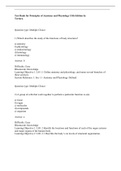
Test Bank for Principles of Anatomy and Physiology 15th Edition by Tortora .
1) Which describes the study of the functions of body structures? a) anatomy b) physiology c) endocrinology d) histology e) immunology Answer: b Difficulty: Easy Bloomcode: Knowledge Learning Objective 1: LO 1.1 Define anatomy and physiology, and name several branches of these sciences. Section Reference 1: Sec 1.1 Anatomy and Physiology Defined Question type: Multiple Choice 2) A group of cells that work together to perform a particular function is a(n) a) tissue b) organ c) mol...
- Package deal
- Exam (elaborations)
- • 50 pages •
1) Which describes the study of the functions of body structures? a) anatomy b) physiology c) endocrinology d) histology e) immunology Answer: b Difficulty: Easy Bloomcode: Knowledge Learning Objective 1: LO 1.1 Define anatomy and physiology, and name several branches of these sciences. Section Reference 1: Sec 1.1 Anatomy and Physiology Defined Question type: Multiple Choice 2) A group of cells that work together to perform a particular function is a(n) a) tissue b) organ c) mol...
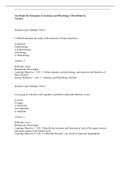
Test Bank for Principles of Anatomy and Physiology 15th Edition by Tortora .
1) Which describes the study of the functions of body structures? a) anatomy b) physiology c) endocrinology d) histology e) immunology Answer: b Difficulty: Easy Bloomcode: Knowledge Learning Objective 1: LO 1.1 Define anatomy and physiology, and name several branches of these sciences. Section Reference 1: Sec 1.1 Anatomy and Physiology Defined Question type: Multiple Choice 2) A group of cells that work together to perform a particular function is a(n) a) tissue b) organ c) mol...
- Exam (elaborations)
- • 50 pages •
1) Which describes the study of the functions of body structures? a) anatomy b) physiology c) endocrinology d) histology e) immunology Answer: b Difficulty: Easy Bloomcode: Knowledge Learning Objective 1: LO 1.1 Define anatomy and physiology, and name several branches of these sciences. Section Reference 1: Sec 1.1 Anatomy and Physiology Defined Question type: Multiple Choice 2) A group of cells that work together to perform a particular function is a(n) a) tissue b) organ c) mol...
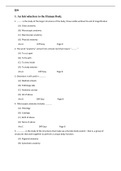
Anatomy and Physiology openstax File Test Bank Questions And Answers 100% Verified.
. .......... is the study of the larger structures of the body, those visible without the aid of magnification (A) Gross anatomy (B) Microscopic anatomy (C) Macroscopic anatomy (D) Physical anatomy Ans A Diff Easy Page 8 2. The word “anatomy” comes from a Greek root that means “........... ’’ (A) To cut apart (B) To fix with (C) To view inside (D) To study exterior Ans A Diff Easy Page 8 3. Dissection is still used in ............. (A) Medical schools (B) Pathology labs ...
- Exam (elaborations)
- • 221 pages •
. .......... is the study of the larger structures of the body, those visible without the aid of magnification (A) Gross anatomy (B) Microscopic anatomy (C) Macroscopic anatomy (D) Physical anatomy Ans A Diff Easy Page 8 2. The word “anatomy” comes from a Greek root that means “........... ’’ (A) To cut apart (B) To fix with (C) To view inside (D) To study exterior Ans A Diff Easy Page 8 3. Dissection is still used in ............. (A) Medical schools (B) Pathology labs ...
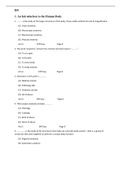
Anatomy and Physiology openstax File (Test Bank).
. .......... is the study of the larger structures of the body, those visible without the aid of magnification (A) Gross anatomy (B) Microscopic anatomy (C) Macroscopic anatomy (D) Physical anatomy Ans A Diff Easy Page 8 2. The word “anatomy” comes from a Greek root that means “........... ’’ (A) To cut apart (B) To fix with (C) To view inside (D) To study exterior Ans A Diff Easy Page 8 3. Dissection is still used in ............. (A) Medical schools (B) Pathology labs ...
- Exam (elaborations)
- • 221 pages •
. .......... is the study of the larger structures of the body, those visible without the aid of magnification (A) Gross anatomy (B) Microscopic anatomy (C) Macroscopic anatomy (D) Physical anatomy Ans A Diff Easy Page 8 2. The word “anatomy” comes from a Greek root that means “........... ’’ (A) To cut apart (B) To fix with (C) To view inside (D) To study exterior Ans A Diff Easy Page 8 3. Dissection is still used in ............. (A) Medical schools (B) Pathology labs ...
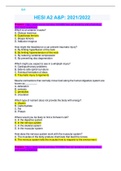
HESI A2 A&P: 2021/2022
Which is an anterior muscle? A. Gluteus maximus B. Quadriceps femoris C. Biceps femoris D. Adductor magnus How might the headrest on a car prevent traumatic injury? A. By limiting hyperflexion of the neck B. By limiting hyperextension of the neck C. By reducing vertebral compression D. By preventing disc degeneration Which might you expect to see in a whiplash injury? A. Cardiopulmonary problems B. Side-to-side spinal curvature C. Eventual herniation of discs D. Traumatic injury to...
- Exam (elaborations)
- • 17 pages •
Which is an anterior muscle? A. Gluteus maximus B. Quadriceps femoris C. Biceps femoris D. Adductor magnus How might the headrest on a car prevent traumatic injury? A. By limiting hyperflexion of the neck B. By limiting hyperextension of the neck C. By reducing vertebral compression D. By preventing disc degeneration Which might you expect to see in a whiplash injury? A. Cardiopulmonary problems B. Side-to-side spinal curvature C. Eventual herniation of discs D. Traumatic injury to...
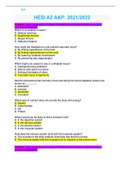
HESI A2 A&P: 2021/2022
Which is an anterior muscle? A. Gluteus maximus B. Quadriceps femoris C. Biceps femoris D. Adductor magnus How might the headrest on a car prevent traumatic injury? A. By limiting hyperflexion of the neck B. By limiting hyperextension of the neck C. By reducing vertebral compression D. By preventing disc degeneration Which might you expect to see in a whiplash injury? A. Cardiopulmonary problems B. Side-to-side spinal curvature C. Eventual herniation of discs D. Traumatic injury to...
- Exam (elaborations)
- • 17 pages •
Which is an anterior muscle? A. Gluteus maximus B. Quadriceps femoris C. Biceps femoris D. Adductor magnus How might the headrest on a car prevent traumatic injury? A. By limiting hyperflexion of the neck B. By limiting hyperextension of the neck C. By reducing vertebral compression D. By preventing disc degeneration Which might you expect to see in a whiplash injury? A. Cardiopulmonary problems B. Side-to-side spinal curvature C. Eventual herniation of discs D. Traumatic injury to...
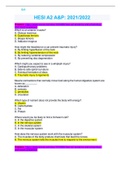
HESI A2 A&P: 2021/2022
Which is an anterior muscle? A. Gluteus maximus B. Quadriceps femoris C. Biceps femoris D. Adductor magnus How might the headrest on a car prevent traumatic injury? A. By limiting hyperflexion of the neck B. By limiting hyperextension of the neck C. By reducing vertebral compression D. By preventing disc degeneration Which might you expect to see in a whiplash injury? A. Cardiopulmonary problems B. Side-to-side spinal curvature C. Eventual herniation of discs D. Traumatic injury to...
- Exam (elaborations)
- • 17 pages •
Which is an anterior muscle? A. Gluteus maximus B. Quadriceps femoris C. Biceps femoris D. Adductor magnus How might the headrest on a car prevent traumatic injury? A. By limiting hyperflexion of the neck B. By limiting hyperextension of the neck C. By reducing vertebral compression D. By preventing disc degeneration Which might you expect to see in a whiplash injury? A. Cardiopulmonary problems B. Side-to-side spinal curvature C. Eventual herniation of discs D. Traumatic injury to...
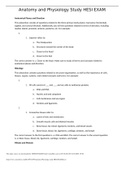
Anatomy and Physiology Study HESI EXAM QUESTIONS AND ANSWERS.
Anatomical Planes and Direction This subsection consists of questions related to the three primary body planes: transverse (horizontal), sagittal, and coronal (frontal). Additionally, you will see questions related to terms of direction, including medial, lateral, proximal, anterior, posterior, etc. For example: 1. 1. Superior refers to: a. The hindquarters b. Structures toward the center of the body c. Closer to the head d. Closer to the feet The correct answer is: c. Closer to the he...
- Exam (elaborations)
- • 3 pages •
Anatomical Planes and Direction This subsection consists of questions related to the three primary body planes: transverse (horizontal), sagittal, and coronal (frontal). Additionally, you will see questions related to terms of direction, including medial, lateral, proximal, anterior, posterior, etc. For example: 1. 1. Superior refers to: a. The hindquarters b. Structures toward the center of the body c. Closer to the head d. Closer to the feet The correct answer is: c. Closer to the he...
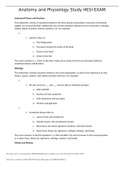
Anatomy and Physiology Study HESI EXAM
Anatomical Planes and Direction This subsection consists of questions related to the three primary body planes: transverse (horizontal), sagittal, and coronal (frontal). Additionally, you will see questions related to terms of direction, including medial, lateral, proximal, anterior, posterior, etc. For example: 1. 1. Superior refers to: a. The hindquarters b. Structures toward the center of the body c. Closer to the head d. Closer to the feet The correct answer is: c. Closer to the he...
- Exam (elaborations)
- • 3 pages •
Anatomical Planes and Direction This subsection consists of questions related to the three primary body planes: transverse (horizontal), sagittal, and coronal (frontal). Additionally, you will see questions related to terms of direction, including medial, lateral, proximal, anterior, posterior, etc. For example: 1. 1. Superior refers to: a. The hindquarters b. Structures toward the center of the body c. Closer to the head d. Closer to the feet The correct answer is: c. Closer to the he...
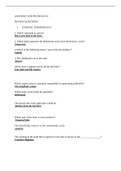
HESI ANATOMY AND PHYSIOLOGY REVIEW
1. Which statement is correct? Hip is proximal to the knee. . 2. Which plane separates the abdominal cavity from the thoracic cavity? Transverse 2.Which of the following means “away from the midline”? Lateral 3.The cheekbones are to the nose. lateral 4.How does a sagittal section divide the body? Into right and left regions Which organ system is primarily responsible for generating antibodies? The lymphatic system Which body cavity holds the appendix? abdominal The lateral sid...
- Exam (elaborations)
- • 28 pages •
1. Which statement is correct? Hip is proximal to the knee. . 2. Which plane separates the abdominal cavity from the thoracic cavity? Transverse 2.Which of the following means “away from the midline”? Lateral 3.The cheekbones are to the nose. lateral 4.How does a sagittal section divide the body? Into right and left regions Which organ system is primarily responsible for generating antibodies? The lymphatic system Which body cavity holds the appendix? abdominal The lateral sid...

ECS1501 EXAM PACK NOTES & PAST QUESTION WITH SOLUTIONS